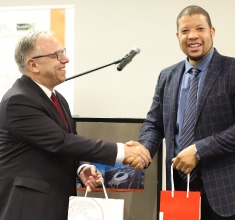Swiss Ambassador commits to socio-economic collaboration with KZN
2023-08-14 10:02:14
Swiss Ambassador to South Africa, Dr Nicolas Bruhl, says his country is ready to support KwaZulu-Natal in its quest to promote inclusive growth through trade and investment.
Bruhl was speaking at a business seminar organised by his embassy and Trade & Investment KwaZulu-Natal (TIKZN) in Durban (on 11 May). âWe are pleased to facilitate such engagements which bring together stakeholders involved in the KwaZulu-Natal and Swiss business eco systems, government officials and market experts, to discuss the investment climate, regulatory requirements and market trends of the KwaZulu-Natal Provincial economy,â he said.
Switzerland has a sub-Saharan Strategy for 2021-2024, with South Africa identified as a country with high economic potential in terms of trade and investment. At R3.3 billion, the bilateral trade value between Switzerland and KZN accounts for 17% of South Africaâs total for 2022*. As a key economic partner, South Africa accounts for almost a quarter of Swiss foreign direct investment in Africa. More than 100 Swiss companies have a presence in South Africa, creating employment for about 50 000 people.
âThis is a platform to provide businesses the opportunity to strengthen existing economic and commercial ties while exploring new avenues for future collaboration,â added Bruhl.
Local business owner Jabulile Gwala, Chief Executive officer of Siko Republic, shared her success doing business with Switzerland. The KZN-based business designs and manufactures vibrant activewear, swimwear and streetwear from recycled materials. Gwala started doing business with Switzerland in 2021, with online workouts a norm, her vibrant African print inspired activewear were getting noticed. âThe brand grew online, and we were getting a lot of orders. I showcased in Switzerland and found there is a growing marketing that is seriously in need and in love with products that are African print inspired and made. It has been hugely beneficial to do business with Switzerland, firstly weâve seen an increase in our profit margins because selling in the stronger Swiss Franc is more lucrative. Weâve also had to improve our innovation, because with new markets come new opportunities and challenges which inspire new ideas.â To further strengthen her brand there, Gwala travelled to Zurich and Geneva. âWe wanted to hear directly from the market that side and figure out what they like. We learned, for example, that Switzerland has some of the best technology for manufacturing of gymwear, but they are not so strong when it comes to leisurewear. That was our big opportunity, so adapted some of the products we are offering in order to meet that marketâs needs.â Gwala encouraged the local businesspeople attending the seminar to take up opportunities to market their businesses but be confident about their products and clear about what they bring to the table. âResearch is great at giving us an understand of the market trends, but that human connection is so important. Go and meet people and tell them your story and the journey of your product, about the place it is made and the people who make it. Allow them to get to know you,â conclude Gwala.
Exporters at the business seminar like Gwala, were able to engage representatives from the Swiss Import Promotion Programme (SIPPO), the State Secretariat for Economic Affairs (SECO), the Swiss Business Hub Southern Africa.
Neville Matjie, TIKZN Chief Executive Officer, has received several foreign business delegations interested in investing in the province.
Matjie has recently hosted the Vietnamese Ambassador Hoang Van Loi. In May TIKZN signed four declarations of intent with the four chambers of commerce from the Colombian provinces of Choco, Buaneventura City, San Andrés Island and Tumaco City, with Vice President Francia Marquez present. âThey want to investigate because we see opportunities in KwaZulu-Natal. The investors coming is testament to the strength of the province and the sectors,â he said.
Thulisile Galelekile, Executive Manager: Strategy and Operations said South Africa and Switzerlandâs extended being collaborating to grow the respective economies. âThere is a desire to collaborate and share ideas when it comes to, improving education, learning from research efforts, as well as to foster innovation. We have also seen over the years, a growing interest in intercultural relations between our two countries which gives us much hope that the relationships being forged will stand the test of time as we share our ways of life with each other not only from an economic standpoint but right down to grassroots level,â she said.